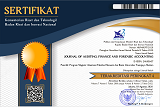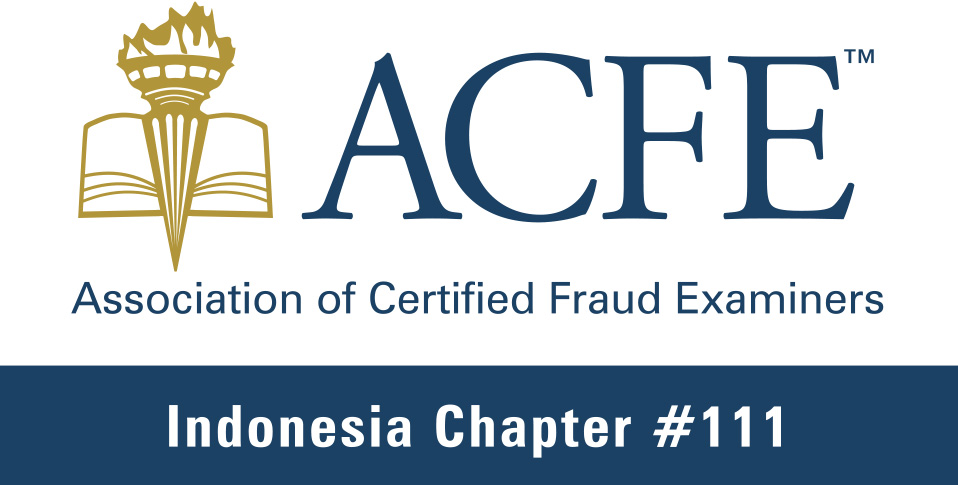Accounting and Fraud Curriculum from The Perspective of Islamic Law
Abstract
Keywords
Full Text:
PDFReferences
Akhtar, Z. (2011). Constitutional Legitimacy: Sharia Law, Secularism and the Social Compact. Indonesia Law Review, 1(2), 107–127. https://doi.org/10.15742/ilrev.v1n2.84
Apostolou, B., Dorminey, J. W., Hassell, J. M., and Hickey, A. (2019). Accounting Education Literature Review (2018). Journal of Accounting Education, 47, 1–27. https://doi.org/10.1016/j.jaccedu.2019.02.001
Asgariyazdi, A. (2012). Characteristics of Islamic Philosophy. Existenz: An International Journal in Philosophy, Religion, Politics, and the Arts, 7(1), 56-59.
Badshah, I., Mellemvik, F., and Timoshenko, K. (2013). Accounting from a Religious Perspective: A Case of the Central Government Accounting in Islamic Republic of Pakistan. Asian Economic and Financial Review, 3(2), 243–258. https://econpapers.repec.org/RePEc:asi:aeafrj:v:3:y:2013:i:2:p:243-258:id:989
Ballou, B., Heitger, D. L., and Stoel, D. (2018). Data-Driven Decision-Making and Its Impact on Accounting Undergraduate Curriculum. Journal of Accounting Education, 44, 14–24. https://doi.org/10.1016/j.jaccedu.2018.05.003
Bullock, J. H., and Ell, V. (1995). Accounting Faculty/Practitioners Partnership to Address Mutual Education Concerns. Issues in Accounting Education, 10(1), 197.
Dzuranin, A. C., Jones, J. R., and Olvera, R. M. (2018). Infusing Data Analytics into the Accounting Curriculum: A Framework and Insights from Faculty. Journal of Accounting Education, 43, 24–39. https://doi.org/10.1016/j.jaccedu.2018.03.004
Efiong, E. J. (2013). A Exploration of Forensic Accounting Education and Practice for Fraud Prevention and Detection in Nigeria. Thesis The Faculty of Business and Law, De Montfort University, Leicester.
Gamage, P. (2016). Big Data: Are Accounting Educators Ready? Journal of Accounting and Management Information Systems, 15(3), 588–604.
Gepp, A., Linnenluecke, M. K., O’Neill, T. J., and Smith, T. (2018). Big Data Techniques in Auditing Research and Practice: Current Trends and Future Opportunities. Journal of Accounting Literature, 40(1), 102–115. https://doi.org/10.1016/j.acclit.2017.05.003
Gray, G. L., and Alles, M. (2015). Data Fracking Strategy: Why Management Accountants Need It. Management Accounting Quarterly, 16(3), 22. https://link.gale.com/apps/doc/A429090804/AONE?u=anon~cd6b803e&sid=googleScholar&xid=35dd76ec
Kamahi, U. (2017). Teori Kekuasaan Michael Foucault: Tantangan bagi Sosiologi Politik. Jurnal Al-Khitabah, 3(1), 117 – 133.
Kennedy, C. H. (1988). Islamization In Pakistan: Implementation of the Hudood Ordinances. Asian Survey, 28(3), 307–316. https://doi.org/10.2307/2644489
Kukreja, G., and Gupta, S. (2016). Tesco Accounting Misstatements: Myopic Ideologies Overshadowing Larger Organisational Interests. SDMIMD Journal of Management, 7(1), 9. https://doi.org/10.15533/sdm/2016/v7i1/90217
Lin, Y.-C. (2018). The Consequences of Audit Committee Quality. Managerial Auditing Journal, 33(2), 192–216. https://doi.org/10.1108/MAJ-03-2016-1350
May, G. S., Windal, F. W., and Sylvestre, J. (1995). The Need for Change in Accounting Education: An Educator Survey. Journal of Accounting Education, 13(1), 21–43. https://doi.org/10.1016/0748-5751(94)00021-2
McGee, R. W. (2001). Suboptimization in Accounting Education and the Subjective Theory of Value: Some Suggestions for Change. Available at SSRN 251471.
Miller, W. F., and Shawver, T. J. (2018). An Exploration of The State of Ethics in UK Accounting Education. Journal of Business Ethics, 153, 1109–1120. https://doi.org/10.1007/s10551-016-3396-z
Munir, M. (2017). Fundamental Guarantees of The Rights of The Accused in The Islamic Criminal Justice System. Hamdard Islamicus, 40(4), 45–65. https://www.scopus.com/inward/record.uri?eid=2-s2.0-85052999028and partnerID=40and md5=08e4c41d25aeb13b82d8743cde4f7151
Nelson, I. T. (1996). A tetrahedral model of accounting education: A framework for research. Journal of Accounting Education, 14(2), 227–236.
Pujiono, P., and Sawarjuwono, T. (2005). Can Violations Of Ethic And Moral In The Practices Of Accounting Be Vanished? The International Journal of Accounting and Business Society, 13(1), 13–32.
Rebele, J. E., Apostolou, B. A., Buckless, F. A., Hassell, J. M.,
Paquette, L. R., and Stout, D. E. (1998). Accounting education literature review (1991–1997), part I: Curriculum and instructional approaches. Journal of Accounting Education, 16(1), 1–51.
Rezaee, Z., and Wang, J. (2019). Relevance of big data to forensic accounting practice and education. Managerial Auditing Journal, 34(3), 268–288.
Riaz, B. (2020). Win the battle, lose the war?: Strategies for repealing the zina ordinance in Pakistan. Muslim World Journal of Human Rights, 17(1), 89–103. https://doi.org/10.1515/mwjhr-2020-0009
Seda, M. A., Peterson Kramer, B., and Crumbley, D. L. (2019). An examination of computer forensics and related certifications in the accounting curriculum. Journal of Digital Forensics, Security and Law, 14(1), 4.
Shihab, M. Q. (2002). Tafsir Al Misbah: Pesan, Kesan dan Keserasian Al-Qur’an. Jakarta: Lentera Hati.
Smith, L. M. (2013). Luca Pacioli: The Father of Accounting. Working Paper. https://medium.com/@arifwicaksanaa/pengertian-use-case-a7e576e1b6bf
Smith, M. (2018). Luca Pacioli: The father of accounting. Available at SSRN 2320658.
Tang, J., and Karim, K. E. (2019). Financial fraud detection and big data analytics–implications on auditors’ use of fraud brainstorming session. Managerial Auditing Journal, 34(3), 324–337.
Tinker, T. (2004). The Enlightenment and its discontents: Antinomies of Christianity, Islam and the calculative sciences. Accounting, Auditing and Accountability Journal, 17(3), 442–475.
Triwuyono, I. (2006). Akuntansi Syari’ah: Menuju Puncak Kesadaran Ketuhanan Manunggaling Kawulo-Gusti. In Jurnal Akuntansi Multi Paradigma (Vol. 2, Issue 2, pp. 1–24). https://www.jamal.ub.ac.id/index.php/jamal/article/view/148
DOI: https://doi.org/10.21107/jaffa.v12i1.24588
Refbacks
- There are currently no refbacks.
Our Journal indexed by:
Our support tools using:



This work is licensed under a Creative Commons Attribution 4.0 International License.












